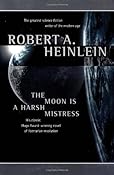
The Moon is a Harsh Mistress by Robert Heinlein
 Admittedly, Heinlein’s book is not the sort normally reviewed here at What Would The Founders Think?, but The Moon is a Harsh Mistress is  fun  to read and the author made some interesting observations about revolutions, revolutionaries, and governance.
Admittedly, Heinlein’s book is not the sort normally reviewed here at What Would The Founders Think?, but The Moon is a Harsh Mistress is  fun  to read and the author made some interesting observations about revolutions, revolutionaries, and governance.
Originally published in 1966, it’s an amazing book if only because there are no glaring missteps in Heinlein’s technology forecast that get in the way of the story. It is just as easy to suspend disbelief  today as it was when it was written.
However, it’s not the technological whiz-bang that makes The Moon is a Harsh Mistress such an interesting book. Heinlein has a great way of bringing the reader up to speed on his fictional world without being pedantic.  He doesn’t try to answer every question or explain every nuance immediately, instead he introduces elements of culture and science in the course of telling the story. The reader is “assumed” to know all of these things as the main character is relating the events to a readership that is part of Heinlein’s world.
In this world, which is about 160 years hence, the moon has been settled, originally as penal colony, similar in history to Australia. Luna is composed of a mixture of newly deported criminals from earth, free settlers whose terms have elapsed, or who were free born. It is governed by a quasi-governmental “Authority.” Because of the difference in gravity and environment, people who spend any length of time on the moon are pretty much physiologically incapable of returning to earth.
Similar to the British colonies in North America, because of its great distance and unique issues, lunar residents develop their own culture and ways of doing things. However, most are content with the status quo. Most …
A handful of radicals recognize that the economic and ecological equilibrium of the moon is unsustainable. In the story, the lunar outpost is exporting wheat and precious water (mined from lunar ice) to earth. Terran residents don’t send anything back. Hence, ecologically and economically the moon is not a closed system. This handful of revolutionaries realize this and also recognize that they are virtually slaves – even those who aren’t convicts. Their task is to foment and guide a revolution successfully before it’s too late.
Heinlein incorporates the lessons from past revolutions into his story as his characters try to avoid the mistakes of the Russian revolution of 1917 and others. Toward the end of the story, the intellectual leader of the movement laments the propensity of human beings to make rules and form governments where they are not necessary. The “congress” that is formed suddenly veers off to create a constitutional convention. Heinlein’s character echoes Thomas Jefferson as he warns them, “. . . like fire and fusion, government is a dangerous servant and a terrible master. You now have freedom — if you can keep it. But do remember, you can lose this freedom more quickly to yourselves than to any other tyrant.” He goes on to urge them to be cautious in the systems that they construct, in particular with regard to legislative bodies. Commenting on a proposed bicameral legislature:
I note one proposal to make this Congress a two-house body. Excellent — the more impediments to legislation the better. But, instead of following tradition, I suggest one house of legislators, another whose single duty is to repeal laws. Let the legislators pass laws only with a two-thirds majority … while the repealers are able to cancel any law through a mere one-third minority. Preposterous? Think about it. If a bill is so poor that it cannot command two-thirds of your consents, is it not likely that it would make a poor law? And if a law is disliked by as many as one-third is it not likely that your would be better off without it?
Heinlein may have been on to something here.
 The posts are coming!
The posts are coming!


1 comment
Sounds like it is a book to read. Thanks for posting it here.
I read it about 35 years ago and do not remember much except that I liked it and, Heinlein, the author.
[Reply]
Leave a Comment